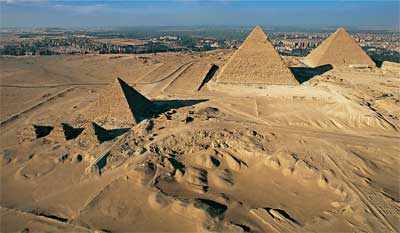|
FOR IMMEDIATE RELEASE
MUSEUM OF FINE ARTS, BOSTON RECEIVES $750,000 FROM THE ANDREW W. MELLON FOUNDATION
MFA Website Will Allow Scholars to Access Excavation Diaries, Photographs and Maps of Egypt’s Famed Giza Pyramids
BOSTON, Mass. (September 18, 2000) — The Museum of Fine Arts, Boston (MFA) has received a $750,000 grant from The Andrew W. Mellon Foundation to provide integrated, online access to its archives documenting its Egyptian excavations at the Pyramids of Giza, one of the world’s most famous archaeological sites. Over the next four years, the Giza Archives Project will convert excavation diaries, historic glass plate expedition photographic negatives, object register books, maps, plans and sketches from the ancient mastaba—tombs and pyramids at Giza—into electronic format to be accessed through the Museum’s website at www.mfa.org. The grant will provide digital access to this unique and irreplaceable collection and will augment the Museum’s efforts to establish an online database of its permanent collection which the Museum will begin posting on its website in December 2000.
"We can now begin to preserve the excavation archives of the Giza Pyramids, one of the MFA’s most important scholarly research projects, thanks to the generous support of The Andrew W. Mellon Foundation," said Malcolm Rogers, the Museum’s Ann and Graham Gund Director. "This grant will allow the MFA to safeguard these materials and allow scholars from around the world access to these remarkable archives."
The Giza Pyramids, the only survivors of the seven wonders of the ancient world, form one part of a vast necropolis, or city of the dead, that housed hundreds of individual tombs of Egypt’s governing classes during the Old Kingdom (Dynasties 4–6, about 2630–2250 BC). The excavations, undertaken jointly by the MFA and Harvard University between 1905 and 1942, uncovered one of the richest collections of ancient Egyptian objects in the world. These artifacts, ranging from masterpieces of royal sculpture to everyday tools and implements of daily life, are now housed at the MFA, the Egyptian Museum in Cairo and in situ at the Giza site (just west of modern Cairo).
"The Mellon grant will allow the international research community and the public access to this unparalleled collection of documents," said Nancy Allen, the MFA’s Director of Information Resources. "Once placed in a digital format, this information will become part of the comprehensive archival database project."
|
